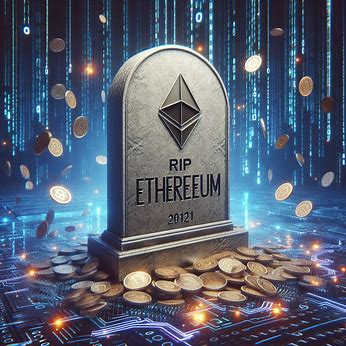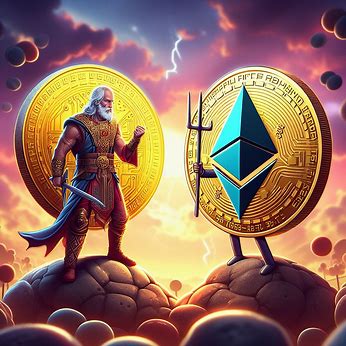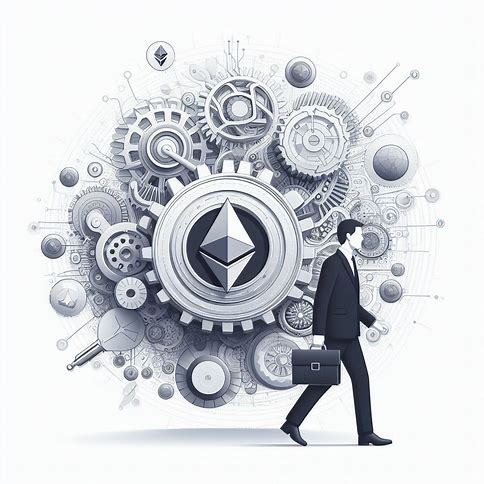Ethereum, the world’s second-largest cryptocurrency, has faced its share of challenges lately. With the rise of competing blockchains and concerns over scalability, some are questioning whether Ethereum’s best days are behind it. Is the king of smart contracts losing its crown, or does it still have a bright future ahead? Here is the answer you need:.
What is Ethereum?
Launched in 2015 by Vitalik Buterin, Ethereum pioneered the concept of a blockchain smart contract platform. It allows developers to build and deploy decentralized applications (dApps) on its network. Ethereum’s native cryptocurrency, Ether (ETH), is used to fuel transactions and execute smart contracts.
The rise of Ethereum
Ethereum gained popularity with thousands of projects and ICOs launched on its platform. Innovative applications in areas like decentralized finance (DeFi), NFTs, and blockchain gaming showcased Ethereum’s versatility. By 2018, ETH had reached a price of over $1,400, and Ethereum seemed poised for dominance.
Challenges Emerge
However, as Ethereum grew, cracks began to appear. The blockchain struggled with scalability issues, leading to slow transaction times and high gas fees during periods of congestion. The rise of DeFi in 2020 exacerbated these problems. At its peak, a simple token swap on Ethereum could cost over $100 in gas.
Ethereum’s planned upgrade to Eth 2.0, which would bring scalability improvements through sharding and a transition to proof-of-stake, faced repeated delays. Meanwhile, competing layer 1 blockchains like Solana, Avalanche, and Binance Smart Chain emerged, touting faster speeds and lower costs. Some began to wonder: was Ethereum losing its lead?
The Rivals Arrive
As Ethereum grappled with congestion and high fees, newer blockchains swooped in to capture market share. Solana, with its high throughput and low-cost transactions, made a splash in the DeFi and NFT spaces. The Solana Summer of 2021 saw SOL’s price surge as users and developers flocked to the chain.
Avalanche, another Ethereum competitor, grew rapidly thanks to its compatibility with the Ethereum Virtual Machine (EVM) and novel consensus mechanism. Its Avalanche Rush liquidity mining program in late 2021 attracted over $1 billion in assets to the young blockchain.
Binance Smart Chain (BSC), while more centralized than Ethereum, offered a familiar EVM environment with much lower fees. PancakeSwap, the leading DEX on BSC, overtook Ethereum’s Uniswap in trading volume at one point. Other EVM-compatible chains like Fantom and Polygon also chipped away at Ethereum’s DeFi dominance.
Related: 10+ Crypto (Play-to-Earn) Games that Pay Real Money
Down but not out
Despite the heated competition, Ethereum is far from dead. It remains the second-largest cryptocurrency by market cap and the most developed ecosystem in terms of dApps and developer mindshare. And while newer chains may boast impressive specs, Ethereum’s decentralization and battle-tested security are unmatched.
Ethereum is also fighting back on the scalability front. Rollup solutions like Arbitrum and Optimism, which process transactions off-chain while inheriting Ethereum’s security, are already lowering costs for users. The full transition to Eth 2.0 may be delayed, but incremental upgrades like EIP-1559 are gradually improving the network.
Key Takeaways
1. Ethereum, the pioneering smart contract platform, faces challenges from scalability issues and rising competitor blockchains like Solana, Avalanche, and Binance Smart Chain.
2. Despite these challenges, Ethereum remains the second-largest cryptocurrency and the most developed ecosystem in terms of dApps and developer activity.
3. Ethereum is addressing scalability through rollup solutions like Arbitrum and Optimism, as well as planned upgrades to Eth 2.0 such as the move to proof-of-stake and sharding.
4. Ethereum’s first-mover advantage, strong brand recognition, and large, loyal community are significant strengths that should not be discounted.
5. While Ethereum has lost some ground to competitors, it is far from dead and continues to adapt and evolve. It remains at the heart of the blockchain revolution.
Frequently Asked Questions
1: Is Ethereum a good investment?
As with any cryptocurrency, investing in Ethereum carries risks. The price of ETH can be volatile and subject to market fluctuations. However, many believe in Ethereum’s long-term potential, given its established ecosystem and upcoming upgrades. As always, do your own research and never invest more than you can afford to lose.
2. Will Ethereum 2.0 solve all of its problems?
Ethereum 2.0, or Eth2, is a major upgrade that aims to address scalability and security through the move to proof-of-stake and the implementation of sharding. While these upgrades should significantly improve Ethereum’s performance, they are not a magic bullet. Eth2 is a complex, multi-phase process that will take time to fully roll out.
3. What are rollups, and how do they help Ethereum scale?
Rollups are layer 2 scaling solutions that process transactions off-chain and then post the data back to the Ethereum mainnet. By moving computation off-chain, rollups can significantly increase throughput and reduce gas fees while still leveraging Ethereum’s security. Optimistic rollups and zero-knowledge (ZK) rollups are two popular types of rollup solutions.
4. Can Ethereum be overtaken by other blockchains?
While Ethereum currently has a significant lead in terms of developer activity and the dApp ecosystem, it is possible for other blockchains to overtake it in the future. However, Ethereum’s network effects and first-mover advantage make it a formidable competitor. Many projects are also building on top of Ethereum rather than trying to replace it outright.
5. Is Ethereum dead?
No, Ethereum is not dead. Despite challenges from competitors and scalability issues, Ethereum remains the second-largest blockchain platform, with a thriving ecosystem of dApps, developers, and users. It is actively working on upgrades and solutions to improve its performance and maintain its position as the leading smart contract platform.










